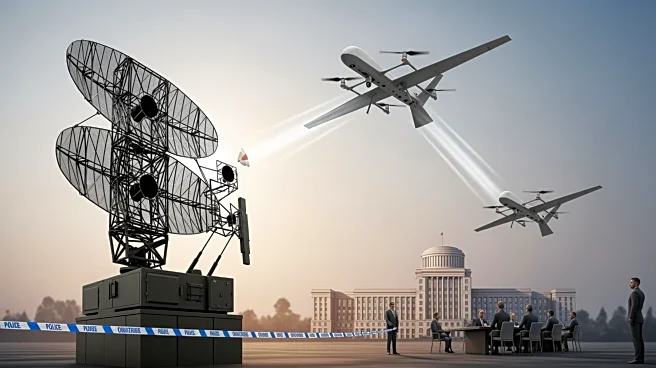What's Happening?
During the night of September 9th to 10th, over a dozen Russian drones violated Polish airspace, prompting a swift response from NATO fighter jets, including Dutch F-35s. While some drones were successfully
shot down, others managed to evade interception, highlighting a significant breach in airspace security. The incident resulted in debris and drone fragments scattered across Polish territory, with some drones penetrating deep into Poland, traveling several hundred kilometers. This incursion is unprecedented in scale and depth, posing a challenge to NATO's defense strategies and testing the alliance's unity and resolve.
Why It's Important?
The drone incursion into Polish airspace represents a strategic move by Russia to test NATO's defenses and erode established international norms. This action challenges NATO to demonstrate credible deterrence while managing escalation dynamics and maintaining alliance solidarity. The incident underscores the need for NATO to adapt its defense strategies to counter such provocations effectively. The incursion also raises concerns about the potential for miscalculations and unintended consequences, which could escalate tensions further between NATO and Russia.
What's Next?
NATO faces the task of reassessing its defense posture and response strategies to prevent future incursions and ensure the security of its member states. The alliance may need to enhance its surveillance and interception capabilities to address the evolving threat landscape. Additionally, diplomatic efforts may be necessary to address the underlying tensions and prevent further provocations. The incident could lead to increased military readiness and cooperation among NATO members to safeguard their airspace and territorial integrity.
Beyond the Headlines
The drone incursion highlights the broader geopolitical tensions between NATO and Russia, reflecting a strategic calculus by Moscow to probe allied defenses and test the alliance's resolve. This situation may lead to a reevaluation of NATO's collective defense principles and the need for enhanced cooperation among member states. The incident also raises ethical and legal questions about airspace violations and the use of drones in military operations, potentially influencing future international norms and agreements.










